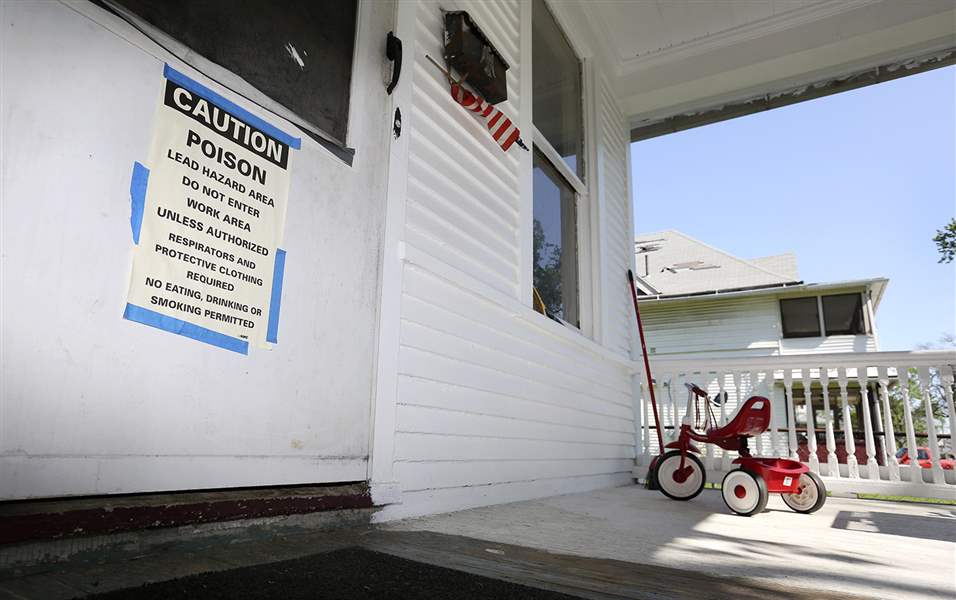
Toledo lead-safe law might be at risk
Ohio House bill would give sole authority over abatement to the state
4/28/2017
A lead hazard sign is posted on a home on Putnam Street in Toledo.
THE BLADE
Buy This Image
A provision in the House Republicans’ budget bill would give the state sole authority on lead abatement activities, which some lead-safe advocates see as an attempt to pre-empt Toledo’s rental ordinance.
The proposal would give the Ohio Department of Health “sole and exclusive authority to compel, prohibit, license, or regulate lead abatement activities within the state, including the licensing of lead abatement professionals and excepting only those activities for which oversight has been delegated by the Revised Code to boards of health.”

Ujvagi
Although Toledo’s law does not require abatement — but rather mandates that affected properties undergo lead-safe inspections, cleaning, and repairs — it’s seen as a possible attempt to usurp or weaken the city’s law, as it voids “any law or rule governing the abatement of lead, lead-based paint, or the employment or licensing of lead abatement professionals.” The language calls regulation of lead abatement “a matter of general statewide interest” that should be handled uniformly.

Welch
Toledo Councilman Peter Ujvagi, chairman of council's urban revitalization and small business enterprise committee, called the measure — which was presented this week as part of the House’s budget proposal — an attack on local governments.

Ludeman
“It is an attack on home rule but it is just an amendment, which does not mean it has support in Columbus,” Mr. Ujvagi said. “It is another attempt to prevent local governments from making decisions for its own citizens.”

Zgodzinski
Mr. Ujvagi said it would usurp the city’s law because it refers to all lead related activity.
David Welch, director of Environmental Health Services for the Toledo-Lucas County Health Department, told the council committee Thursday that 71 properties have been registered under the city lead law; an informational video and database would be on the agency’s website today; and all city property owners will get a flyer on the law and may call 419-213-4251 for lead law information.
The state provision was not discussed during the committee hearing.
Toledo’s law — initially passed by council last year — requires rental properties with one to four units built before 1978 and homes that operate day-care programs to be inspected visually for lead hazards like peeling paint and tested for lead dust before they can be issued lead-safe certificates. Council passed an amendment April 18 that extended the compliance dates for property owners with staggered deadlines of June 30, 2018; June 30, 2019, and June 30, 2020, based on the census tracts.
There are about 15,000 properties that must be registered by that June 30, 2018, deadline, Mr. Welch said.
“It’s absolutely a shot at Toledo,” Bob Cole, a member of the Toledo Lead Poisoning Prevention Coalition which advocated for Toledo’s lead-safe rental law, said of the Ohio House provision. “It’s coincidental it comes a week, 10 days after the [city] amendment was passed? It’s absolutely related to that.”
Mr. Cole, who is also a managing attorney for Advocates for Basic Legal Equality, said the lead coalition is now working to better understand where the budget language came from and the rationale behind it. The coalition has long touted Toledo’s law as the only one in Ohio to currently take what they call “a primary preventive approach” to preventing children from getting lead poisoning from their homes.
“It’s an attempt to limit a city like Toledo from improving housing conditions for low-income renters in the community,” he said of the amendment. “It’s for landlords who don’t want to comply with the ordinance and don’t want to provide lead safe rental properties.”
Councilman Rob Ludeman, a Republican and Realtor, had not seen the provision but said he’d oppose any attack on home rule.
“I think they realize in Columbus, and this is a Republican talking, over the years we led the charge on the smoking ban and then a few years, texting while driving,” Mr. Ludeman said.
Eric Zgodzinski, health commissioner for the Toledo-Lucas County Health Department — the agency tasked with enforcing Toledo’s lead law — said he and his staff would take a close look at the proposed budget amendment and ask the board of health’s legislative committee to start contacting elected officials.
“ODH does a lot of great things for health in the state, but locally we are marching to our own tune and can handle our own issues,” he said. “The ordinance we have now shows the legislative body we have locally can make change. I’m not sure that can happen on the state level.”
ODH spokesman Russ Kennedy said the department is studying the language and declined to say if it would support the measure.
“We did not propose that budget item and we are not aware of who did,” he said. “We are still analyzing it ourselves.”
Rep. Mark Romanchuk (R., Mansfield), who is chairman of the House Finance Health and Human Services Subcommittee, did not return a call Thursday afternoon. The House version of the budget is expected to be sent to the Senate next week.
Patricia Barnes, executive director of Ohio Healthy Homes Network, called the budget addition “a really bad idea.”
“The Toledo lead law is the only lead safe housing law in the state,” she said. “We need to learn how to make these work if we’re going to try to do a better job of protecting kids from lead poisoning. We need these types of approaches [like Toledo] where we emphasize lead-safe maintenance. It appears to be a good place to start that doesn’t put too much of a burden on property owners to get their properties into compliance.”
The city law has been unpopular with many real estate agents and landlords, who packed city council meetings over the last year to call for its repeal or to ask that the provision requiring dust wipe tests be removed, measures that were both ultimately unsuccessful.
Staff writer Ignazio Messina contributed to this report.
Contact Lauren Lindstrom at llindstrom@theblade.com, 419-724-6154, or on Twitter @lelindstrom.